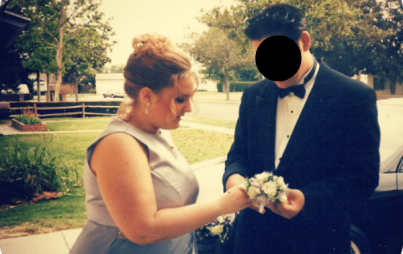
Photo by Anthony Ginsbrook on Unsplash
This article first appeared on Role Reboot and has been republished with permission.
Recently, social media was abuzz with yet another story about a female teacher having sex with her underage male student: “Second student stood guard inside school while Arizona teacher and 13-year-old had sex, police report says,” read one headline. “Former teacher accused of having sex with student while other student watched,” read another.
Except what happened wasn’t “sex” — it was rape.
Twenty-eight-year-old Brittany Zamora molested and raped her 13-year-old male student multiple times; one time making his friend guard the classroom door. When she asked his friend to be on the lookout a second time, he refused:
“It’s, like, weird how a 27-year-old can, like, love a 13-year-old and do stuff?” said the 6th-grader. “It’s just crazy. She’s not a good person.”
While the victim’s friend intuitively understood that what happened to his friend was wrong, many commenters on social media – most of them grown men – didn’t seem to get what all the fuss was about. In addition to the usual, “Where was she when I was in school?” comments, it was clear that, for a lot of men, this story was about a boy scoring with a hot older teacher:
“Wow. Imagine smashing that at 11 or 12,” read one comment. “Man is it just me or these shorties getting luckier each year,” read another.
It may be tempting to dismiss these comments as “guy talk” or their opinions as outside the norm — but the reality is that in our society, the idea that a boy or man can be raped by a woman is often seen as ludicrous.
Even impossible.
Growing up as the only girl in a family of six, it was clear from a young age that I had something to fear that my brothers didn’t. I wasn’t allowed to spend the night at my friends’ houses because of their fathers. I was taught that my clothes could make me a target for unwanted male sexual advances and that I always needed to be on-guard — even around male relatives.
I understood that my being a girl made me vulnerable and a danger to myself and others. I understood that I would always have to be on-guard for “bad men.” My father warned me about “how men thought” and my mother and grandmother forwarded me email chains about how to walk to my car at night and why I shouldn’t wear my hair in a ponytail. Watching movies, rape seemed to be the one plot twist I could count on for my heroines.
Rape was synonymous with being female. But why?
For the majority of U.S. history, rape was understood as a man forcefully penetrating a woman. Until 2012, the FBI defined rape as, “The carnal knowledge of a female forcibly and against her will.” While critics rightfully argued the definition limited rape to an act of physical violence, the new definition did little to erase the gendered framing:
“Penetration, no matter how slight, of the vagina or anus with any body part or object, or oral penetration by a sex organ of another person, without the consent of the victim.”
The new definition makes it clear that the U.S. government still understands rape to require penetration of some sort – meaning a person with a vagina cannot rape someone with their vagina. It reveals the deeply stubborn belief that a man, or even a boy, cannot be raped by a woman.
You Might Also Like: Ask Erin: Did I Commit Marital Rape?
During Old Testament times, women were legally male property. Under Mosaic law, rape was understood as a violation of another man’s property. As psychologist and former fundamentalist Christian Valerie Tarico points out in her piece, “What the Bible Says About Rape,” rape equaled damage done to another man’s property and reputation:
“The punishments for rape have to do not with compassion or trauma to the woman herself but with honor, tribal purity, and a sense that a used woman is damaged goods.”
Of course, the Old Testament isn’t unique or even archaic in its view of rape. Until almost 1900, American wives were effectively the legal property of their husbands under the doctrine of coverture. Coverture (sometimes spelled couverture) was a legal doctrine whereby, upon marriage, a woman’s legal rights and obligations were subsumed by those of her husband.
Even after the abolishment of coverture in the late 19th century, other laws and practices still effectively treated married women as the property of their husbands — which is why marital rape wasn’t outlawed in all 50 states until 1993.
It’s clear from a historical perspective that our idea of rape, and even sex for that matter, was and still is deeply gendered.
Rape is understood as something that inevitably happens to women and girls and something that men inevitably do – as is sex. For example, it’s commonly understood that:
- Sex is something that men do to women.
- Men don’t get fucked, they fuck.
- Likewise, rape is something that men do to women.
- Men don’t get raped, they rape.
It’s as if rape is almost natural — inseparable from who we are as men and women. Men want sex, they are always supposed to want sex. Even at 13, that boy had to want it, right? I mean, did you SEE her?
Or so it goes …
In a patriarchal culture, the worst thing a man can be is a woman.
Patriarchy dictates that men dominate women — financially, physically, sexually, etc. So to admit that a man or boy can be raped by a woman is to admit that men can be weak; can be vulnerable. It’s to acknowledge that men are not absolutely dominant and women absolutely subordinate.
This is why so many men don’t want to admit that men and boys can be raped by women. It’s why our president dismissed the rape epidemic in our nation’s military by saying, “Well, what did they expect when they put men and women together?”
Patriarchy, not unlike Abraham in the Old Testament, will sacrifice its own to prove allegiance to the hierarchy. To maintain the hierarchy. After all, what’s a 13-year-old boy or two in the larger scheme of things?







